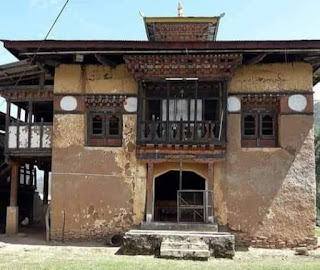FROM ARMED PARLIAMENTARIANS TO PEACEFUL DEBATES BY KINLEY WANGCHUK
🅒 2024 by Kinley Wangchuk
All rights reserved
Cover illustration: Jigme Yangchen Gama
The views expressed in this publication are those of author’s
and not necessarily represent any institutions he may be
affiliated with.
No part of this book may be reproduced, stored in a retrieval
system, or transmitted, in any form or by means, electronic,
mechanical, photocopying, microfilming, recording, or
otherwise, without permission from the publisher.
BICMA Registration No: 100001144
ISBN: 978-99980-794-2-7
Printed by Bhutan Printing Solution
Supported by: International IDEA
PREFACE
Over the past fifteen years since Bhutan adopted democracy in
2008, significant progress has been made in comprehending the
fundamental principles and operational mechanisms of democracy.
This progress has also involved rectifying misconceptions and
enhancing citizens’ engagement in democratic processes. Despite
these advancements, there remains a shortage of structured
political literature that serves as repositories of vital information
for academic, parliamentary, and general readership. Additionally,
a considerable portion of the existing literature, including books,
journals, and various formats, is authored by foreign scholars
or independent researchers with limited practical experience in
politics and parliament.
Consequently, numerous critical pieces of information,
both of scholarly import and public interest, remain largely
unexplored. Leveraging my five-year tenure in parliament from
2018 to 2023, I engaged in a reasonably comprehensive discourse
regarding the critical facets of Bhutan’s historical, contemporary,
and prospective trajectory, with a particular focus on democratic
dynamics.
Across seven chapters, each comprising several topics
and sub-topics, I elucidated a continuum of political ideologies
grounded in Buddhist principles. Additionally, I delved into
a series of politically pertinent proverbial theories rooted in
Bhutanese traditions and beliefs, which may hold scholarly
interest. The exposition accorded significant importance to
parliamentary settings, procedures, and protocols indispensable
for democratic advancement. Furthermore, it addressed gender-
related concerns and disparities within the democratic framework,
acknowledging their pivotal role in nurturing inclusive and
equitable governance.
When providing observations and recommendations on
specific plans and policies of successive governments, it is essentialiv
to acknowledge that some readers may not completely agree with
all stated recommendations. This discrepancy could partly stem
from the inherently political nature of such discussions. Despite
efforts to present observations supported by relevant sources
and varied perspectives, certain readers may perceive a bias in
particular aspects and may hold reservations concerning my prior
political affiliation. In such cases, I extend my apologies for any
unintended misinterpretations.
Given Bhutan’s fledgling democracy, fostering an
environment conducive to robust debate and dialogue is
paramount. I sincerely offer this book for your consideration,
hoping that it contributes positively to the ongoing discourse on
democratic principles and practices in Bhutan.
Kinley Wangchuk
Former Member of Parliament
Summary of one of the Chapters from the book “From Armed Parliamentarians to Peaceful Debates” is included here for readers. The book in hardcover is available in institutions across the country and in the National Library of Bhutan.
CHAPTER 6
PARLIAMENT’S UNIQUE SYMBOLISMS AND
PROCEEDINGS
In the realm of Bhutanese traditions, a notable practice that distinguishes itself is the inclusion of lethal war swords (known as patag) within the august halls, borne by Members of Parliament. This practice stands in stark contrast to procedures in other parts of the world, where stringent measures are taken to prevent the entry of weapons into parliamentary spaces, often due to the occurrence of altercations requiring security intervention.
Carrying war swords to the Supreme house is also symbolic in essence to pay tribute to our ancestors who had fought with bare 'patag and drali' (swords and shields) to protect this beautiful nation against several mighty forces in the past including British India. There exists a parlance 'དཔའ་རྟགས་འཁརཝ་བཙུགས། རྒྱལ་ཁབ་སྲུང་སྐྱོབ་འབད།' to honour our forefathers.
The symbolic act of carrying war swords into the highest legislative body serves as a homage to ancestors who valiantly defended the nation using mere 'patag and drali' (swords and shields) against formidable adversaries, including British India. The expression 'དཔའ་རྟགས་འཁརཝ་བཙུགས། རྒྱལ་ཁབ་སྲུང་སྐྱོབ་འབད།' encapsulates the sentiment of honoring forefathers who safeguarded the nation's integrity.
From a spiritual perspective, swords symbolize wisdom—Sherub Reldri. Lord Jampelyang (Manjushri) is often depicted wielding a sword, signifying the intellectual acuity expected of MPs within the parliamentary arena. This intellectual rigor, rooted in wisdom, fosters the development of sound legislation and policy decisions.
While the ceremonial nature of the paraphernalia carried by MPs is evident, it is imperative that these symbols be treated with utmost ethical consideration, reverence, and discipline. His Majesty's sentiment that "Kabney patag should be perceived as responsibility not as authority" underscores the significance of viewing the scarf and sword bestowed upon MPs as emblems of duty rather than mere symbols of power, highlighting the gravity with which these traditions are regarded.







Comments
Post a Comment